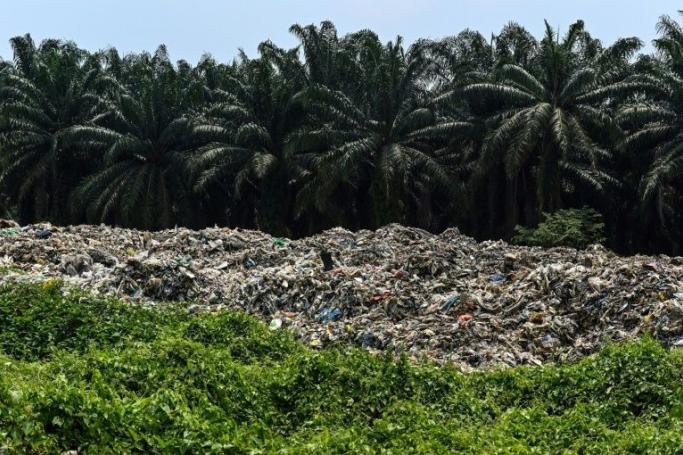Criminal networks are profiting from an "overwhelming" surge in plastic waste being shipped from rich countries to Asia and stoking pollution by burning and dumping waste that was supposed to be recycled, a report by Interpol said this week.
Plastic consumption has exploded in the last decade, with some 360 million metric tons of waste generated just in 2018, mainly by wealthier nations, Interpol said.
At least 8 million tons of plastic are thought to end up in oceans every year.
Some countries have imposed recycling targets, rising above 30 percent in Europe, and the report said this had helped drive a lucrative market for used plastic that is projected to reach $50.36 billion by 2022.
But it has also spurred unscrupulous operators to cash in on an industry that is difficult to police, Interpol said, adding there was an "urgent" need to identify how criminals were exploiting loopholes in regulation.
The France-based intergovernmental crime-fighting agency said organised criminal networks use legitimate pollution management businesses as a cover for illegal operations, and that waste crime was behind environmental destruction and even murder.
"Global plastic pollution is one of the most pervasive environmental threats to the planet today, and its correct regulation and management is of critical importance to global environmental security," said Calum MacDonald, who heads Interpol's Environmental Compliance and Enforcement Committee Advisory Board, in a statement.
- 'Artificial' recycling rates –
The report, written with input from 40 countries, said that many recycling targets were impossible to verify given the "poor visibility" into whether waste was in fact recycled.
This is of particular concern in countries that do not have the capacity to process even their own domestic rubbish and struggle to enforce regulations.
Interpol said some major destination countries report high waste mismanagement rates, including India (87 percent), Indonesia (83 percent) and Malaysia (57 percent).
"Those numbers indicate that exporting nations may report artificially high recycling rate for their plastic waste, while in fact strong uncertainties remain on how plastic waste shipped overseas is treated," the report said.
Illicit shipments of waste -- from homes and supermarkets in Europe and North America among others -- have surged towards South and Southeast Asian nations in the last two years after restrictions on imports were tightened in China in early 2018.
As the market shrank in China, which previously processed almost half the world's plastic waste, firms moved their business to neighbouring countries, the report said, adding that the quantities of waste had proved "overwhelming" for some nations.
- World's 'garbage dump' –
It said this had spurred growing illegal waste treatment in emerging destination countries, with a pronounced increase in plastic waste being diverted to unauthorised recycling facilities.
An example is the small town of Jenjarom, not far from Kuala Lumpur in Malaysia, where plastic processing plants suddenly appeared in large numbers in 2018, with huge mounds of waste piled up in the open and burned, pumping out noxious fumes.
Several Southeast Asian nations are trying to push back on this onslaught of international refuse, but Interpol said efforts to repatriate waste remain "long and challenging" and shipments can end up stuck in ports for months or even years.
Earlier this year Malaysia sent back dozens of shipping containers of plastic waste to mostly wealthier nations, saying it would not be the world's "garbage dump".
Challenges include identifying where the waste has come from, as networks re-route illegal shipments and use transit countries to disguise their origin, Interpol said.
It warned that even as restrictions tighten in some nations, traders would re-route shipments to "new and vulnerable countries", noting illegal plastic waste shipments had already been detected heading towards Laos and Myanmar.
- Plastic planet –
The illegal activity does not only touch Asian nations.
Interpol said organised crime groups were operating in parts of Europe, warning that related waste crimes were becoming "more complex and increasingly threatening".
In France, it said the mayor of the town of Signes was murdered in August 2019 for trying to prevent illegal waste being dumped.
The report said greater international cooperation was needed to curb waste crime, even as rules are set to be tightened from 2021.
Commenting on the research, WWF-International called for "systemic change and greater accountability" in the way plastic waste is used and disposed of.
"Waste crime is a rising threat with roots in a more fundamental problem: the inability to manage our plastic use and production," said Eirik Lindebjerg, global plastics policy manager at WWF-International.
AFP












